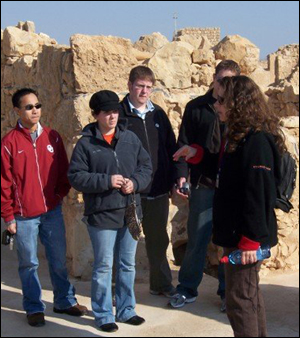SGA president visits Israel with other student leaders
Thursday, February 15, 2007

When Claire Carter decided to attend an eight-day leadership seminar in Israel, she had only a vague notion of the impact the journey would leave on her.
Carter, president of Oklahoma State University’s Student Government Association, was among a group of university student body presidents asked to travel to the Middle East.
“A group called Project Interchange brings different groups to Israel for seminars,” Carter said. “These seminars examine regional conflicts and explore the future of the region from different perspectives.”
Oklahoma was well represented among the delegates, according to Carter.
“I went with a group that was made up of student body presidents from Midwest universities. Oklahoma was the only state with three delegates,” said Carter, an interior design senior. “I’m sure the others were tired of hearing Oklahoma’s state song when the seminar was over.”
The group arrived in Jerusalem on Dec. 27 and witnessed a rare event that had not occurred in Israel since 2004: snowfall.
“To look out from the hotel and see the skyline of Jerusalem covered with snow was indescribable. It took my breath away,” Carter said.
The first day’s events also included a discussion with a retired Israeli colonel about the country’s strategic role in the region, a walking tour of Jerusalem and a tour of the Hebrew University of Jerusalem.
“Speaking to the student government, it was not the differences that surprised me as much as the similarities,” Carter said. “At the same time, students in college are older in Israel because, after high school, everyone is drafted into military service for two years.
“Many have families and jobs in addition to going to college.”
The Project Interchange experience also included a visit to the Yad Vashem Holocaust Memorial and the Western Wall, considered by many to be the holiest place in Israel.
“The children’s section in Yad Vashem contains a memorial to the millions of nameless children lost during the Holocaust. Seeing that exhibit and realizing the hatred that motivated those acts was troubling,” Carter said.
Seeing the physical locations of biblical events also affected Carter.
“I did not know how much going to a land to study other’s beliefs would strengthen my own,” Carter said. “The group toured areas documented in the Bible, and I realized that it did not matter to me if an event took place on this hill or that hill.
“It matters to me that the event happened. Where it occurred is irrelevant. Coming to that realization really strengthened my faith.”
While topics such as Israel’s economy, its immigration and absorption policies and the United States’ role in the region made for insightful discussions, Carter found the interaction with fellow college students in Israel most enriching. A tour of Sapir College was a particularly eye-opening experience.
“Many students speak different languages, and others can communicate only in Hebrew,” Carter said. “I observed a Hebrew class and sat by one person who spoke Spanish and one who spoke German.”
Located near the Israel border, the campus is subject to sporadic missile and mortar fire from neighboring Palestine.
“Seeing these students attend class, knowing that they could be injured or killed, really made me appreciate the true value of education,” Carter said. “We cancel class when snow accumulates on the ground while these students are literally risking their lives to attend class.”
Carter said Israeli citizens remain in a constant state of readiness to defend their nation, the result of years of hostilities with its neighbors since Israel was created in 1948.
“There are people with large machine guns everywhere. I was extremely uncomfortable until I learned that only people who had served in the army and had been trained to use these weapons were allowed to carry arms,” Carter said. “The only time I worried was when the person sitting beside me at lunch had a machine gun casually lying in his lap. I thought, ‘Can you at least put it under your chair?’”
She was especially surprised by the positive view of Americans in Israel.
“Israelis love Americans,” Carter said. “Except for Hebrew on the signs, the experience was comparable to visiting a different city in the U.S.”
